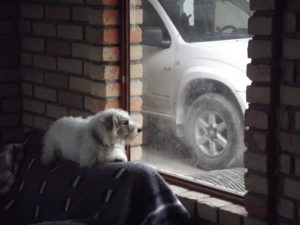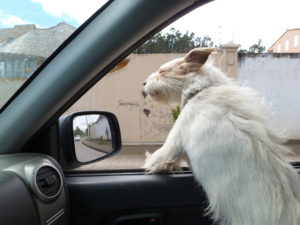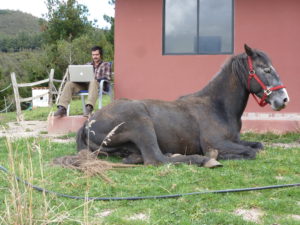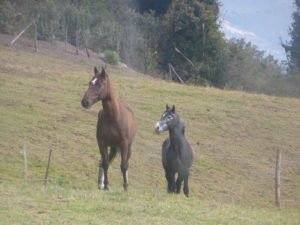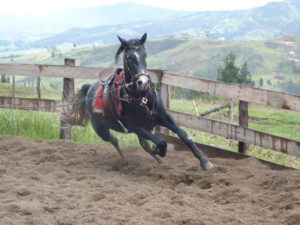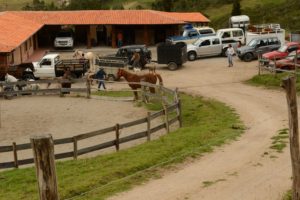
Ever wonder about the Saturday destinations of all those horses in trailers on the winding roads up and down mountains in Ecuador? We’re all headed to join other eager horses for a “Paseo.”
The thrill woke me at 2:30 in the morning and I tossed and turned until I finally gave up and ate breakfast at 4.
At dawn, I opened the side-swing trailer back door and Bandolero, my liver- colored gelding quarter-horse, leapt the two foot rise with a loud clang. We drove out and down the mountain dirt road and then up the erosion-gouged entrance to my friend’s ranch. We loaded his white Arab stallion Sasu who immediately started to annoy my horse but was thwarted by a quick tie-off to the side.
We stowed Alfredo’s rain gear, tack, and saddle into the back seat of my crew- cab Chevy 4-by-4 pickup truck and off we went. My trailer has a roof and forward compartments for accessories and is heavy by itself, but with the two big horses and the steady three-thousand foot climb out of Cumbe, my trusted truck began to overheat. We stopped twice on the shoulder with the engine a needle’s width from the red zone. She idled herself to cool-enough, and we lumbered on. Once up on the high plain, the road leveled and we cooled down and picked up our pace to 80 km/hr.
An hour and a half south of Cuenca, by the side of the road, we met up with the other Vaqueros. Two cowboys sat at the dash of an older red Mitsubishi double cab pickup truck towing an open trailer with two calm horses (looking around); a black Trooper, open trailer and a single horse; and finally a snazzy new white Mitsubishi truck with two horses in an open trailer. That made a nice convoy of men in cowboy hats in pickup trucks.
After another half hour we turned left and up a cement road into the little town of Ona. We wove on small streets into a crowded central square which was readying itself for a celebration. It was early, so the stage was vacant. Streamers caught the breeze and the fire crackers didn’t bother the horses. Nor did the fact that we were lost. The correct turn was back a block. We reversed, four competent drivers turning appreciative local heads.
We twisted and turned out a pot-holed dirt road for 5 km to our destination. Seven men, seven horses and one dog off-loaded at the ramshackle farm. Chickens scattered, dogs barked and a small but stout horse tugged at his stake rope, excited by the new arrivals. This pony-sized horse would be our guide’s mount.
This was a dry part of Ecuador and the wide open vistas scanned parched sloping mountains of scrub brush and occasional pastures.
Without delay, we saddled up and donned caped oil-cloth drover coats and cowboy hats. All except me. I’m relatively new to riding and I wear a polo helmet. Also, I could only envy their coats. And I figured that with all their rain protection, and even with a heavy overcast, it would surely not rain.
Bandolero is a calm horse. I ride him two or three times a week. We’ve been horse-and-rider for two years. We’ve been on countless Paseos. Sometimes he’s a little feisty, especially when I force him to the back of the group. He thinks he’s a race horse and expects to lead the pack. And I’ve yet to cure him of his mounting dance. When I’m a second from raising my boot to stirrup, he begins to circle to the left. I need to hop hop.
This morning he was particularly dance proud, but I managed to get up in the saddle. Once settled, the unsettling began. He buzzed with energy, as if he had fire ants under the saddle, on the edge of out-of-control. He made “frisky” look like a sleeping baby. I had my hands full and my legs wrapped.
We were the first to follow Manuel on his diminutive horse up into the fields and Bandolero bucked and backed-up and side-stepped and threw his head. I hadn’t thought to use a martingale to limit his head thrusts back into my forehead. We managed to get up to the high road, where I thought I could burn off some of his energy. We galloped up the 200 yard rise, turned and trotted back. Twice. This did little to calm my boy. When joined by the other riders, I dismounted and took a lead rope and hooked it into the leather strap under his chin then through his girth and back. At least now I didn’t need to worry about being knocked out cold by his wild head thrashes.
My dog Jack was along for the ride. He is a mail-box sized, white, long-legged, rough-coated Jack Russell Terrier. A year ago I’d run him over with my truck tire. This resulted in a dislocated hip and an operation. He was trampled a month ago on another Paseo. He’d already managed to explore a briar patch and his snout, chest and feet were covered with teeny round green stickers. His legs were caked with mud. He kept up nicely as we trotted along, running well off to the side, perhaps remembering his close brush with equestrian death, lying stiff legged with vacant eyes and blood in his mouth. (Another story).
We left the gravel road and climbed into the aromatic sage-covered hills. So far, so good. It was easy going and I was still on the semi-control side of my horse. The trail led down to an open plain next to a river. It was an opportunity to let him run, so I made the kissing sound that released him and we galloped full-out to the far edge of the field.
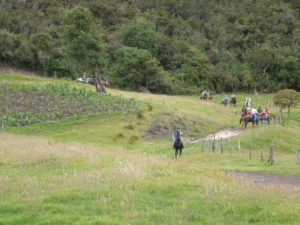
Then the trail got skinny. Ecuador is vertical. We were at the low level of the day and rode the right side of the roaring river on a narrow ribbon of trail scarfed along the mountainside to a narrow open bridge 30 feet above the flowing water. I dismounted and led Bandolero across. We did the dance routine again on a rock slope with a precipitous drop to the river below. In my frustration, I slapped him upside the head and he held still.
Imagine walking upright up a ladder but the rungs are irregular rocks and the voids are mud. You’re on a horse. We climbed and climbed. All the horses lathered up, first white sweat foamed where the reins met the neck and where the bridles circled the ears, then they were soaked. Their nostrils flared with each heaving breath.
All of the Ecuadorian Andes seem to be 45 degrees or steeper. Sometimes the down-trail is so steep that you’re convinced that you and your saddle will be pitched over the horse’s head. You can’t seem to lean back enough. Your horse’s front legs will surely collapse. You’re left with only faith. Your horse tucks his hind legs and slides.
Where there was mud, it was invariably deep. Hooves buried and sounds sucked with each step.
The trails switchbacked and dropped dramatically at you elbow. The line of horses lumbered up the narrow high-sided, rock-strewn trail, nose to tail until a straight stretch urged them to lope. Don’t look down.
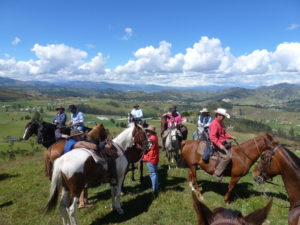
Two hours of this and Bandolero showed some calm. It was unsettling to be riding a fidgety horse on the edge of a precipice, and the stress was getting to me. I’d barely had time to look around to appreciate the majesty of my surroundings. We occasionally broke and sat in pastures of soft grass as the horses grazed around their bits. We passed the cocktail bottle, ribbed each other and admired the scenery.
We rode up and down impossible trails. These horses were used to this, but some were more sure-footed and confident than others. These horses faced rocks and mud and dramatic fall-offs and six inch channels to place their hooves. The switchback’s turn was often slippery. They clattered up. It surprised me that more legs weren’t cut, scraped and bloody.
Bandolero was especially sure-footed. He would stop and survey an obstacle then proceed according to his plan. He was not bashful or scared, nor was he oblivious to the dangers a foot-fall ahead. We crossed a stream without hesitation but the following horse shied and had to be pulled and prodded across. She panicked midway and ended up splayed across the slick ledge.
We stopped for a scheduled lunch at Manuel’s father’s place; a tidy family compound with ducks corralled in a tiny pond to the left of the sweeping path running down to the house. I unsaddled Bandolero so he didn’t roll on his back and wreak the gear. I tied him to a fallen log.
Chickens scattered and dogs barked, again. Scraggly Jack stood nose to nose in introduction, his tail vibrating. We seven sat shoulder to shoulder, filling the table in the dark kitchen. It was a lean-to addition with rough eucalyptus rafters, a corrugated tin roof and plank walls. The hard-pack earthen floor sloped. Shingles shimmed a gas stove. Pots of soup and potatoes boiled on the burners. Mother and daughter served the chicken-foot soup then plates brimming with the potatoes, feed corn on the cob, a fried egg and a slice of salami. Sparse foodstuffs sat on raw-wood open shelves and an incongruously modern refrigerator dominated the right wall. We got red Jell-O served in cups for dessert.
The remainder of the ride climbed another mountain on seldom used jeep trails that joined the gravel road that led to Manuel’s house.
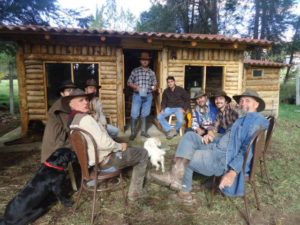
The truck warmed up but didn’t overheat on the two hour ride back to Cuenca. We dropped Sasu and Alfredo, then made it back up the 4 kilometers to my place.
It was 8 o’clock; two hours dark. I turned on the stable lights and Bandolero jumped out and into his stall for grain, hay and water. His work was done.
It didn’t rain. I’m alive. Jack is sleeping on the sofa. My horse is stabled and unscathed. I’ve earned a day off.
